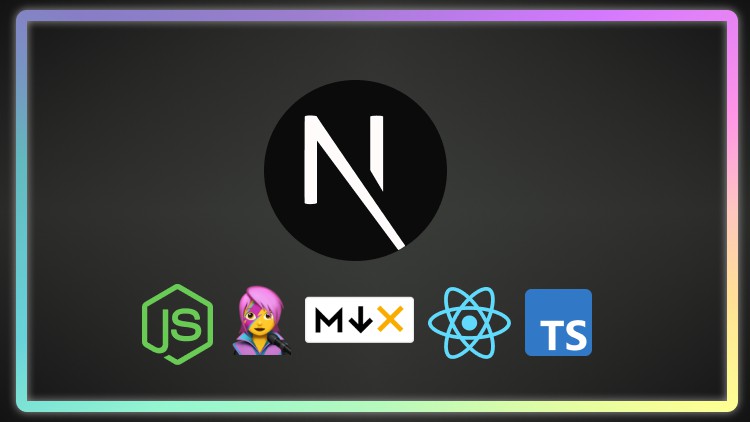All about Next.JS – FreeCourseSite
Smoothly sailing from setup to production
What you’ll learn
All about Next.JS – FreeCourseSite
-
Develop serverless/JAMstack applications with NextJS, React, and TypeScript
-
Understand the advantages and best practices regarding Serverless architecture and how to use them to your advantage
-
Adhere to SEO (Search Engine Optimisation) best practices and make your content easily indexable to all search engines
-
Understand what React, NextJS, TypeScript, and modern tooling can do for you, and use them in the best way possible
Requirements
-
Fundamentals of HTML, CSS, and JavaScript
-
No previous knowledge of TypeScript, NextJS, or Serverless
Description
Is this course right for you?
This course is meant for everyone wanting to level up their application delivery with best practices and unparalleled Developer Experience.
- If you‘re an inexperienced developer trying to figure out what stack to choose and how to start a web application.
- If you‘re an experienced developer who wants a consistent workflow with a set of low-dependency resources that integrate seamlessly and provide the best-in-industry User Experience
What are the JAMstack and Serverless?
JAMstack is modern web development architecture based on client-side JavaScript, APIs, and prebuilt Mark-up. It leverages Serverless architecture to create reusable (micro)services as reusable APIs. It pre-builds all content of a website when possible and makes it available through the edges of a Content Delivery Network.
A JAMstack application is either statically generated (Static Site Generation – SSG), rendered on the server (Server-side Rendering – SSR), or uses a more advanced combined technique: Server-side Pre-Rendered (SSPR). In this course, we will use SSPR to use the best SSG and combine it with SSR.
The dream stack for the JAMstack:
- NodeJSlike an iceberg, there is a big chunk of a NextJS app that runs on the server. For that, we need NodeJS. On top of that, we will create our Serverless Functions, which will run entirely on the server with NodeJS.
- TypeScriptwhen properly set, strong-typing brings to the table a huge advantage when using external resources (such as libraries and frameworks). It makes the code more discoverable since text editors (like VSCode) can provide insights when we‘re writing the code, and safeguard us from runtime errors. It makes the code self-documented and allows us, in the future, to touch many moving parts without fear of causing unexpected side effects.
- Reactwe will build an app that takes out most of the Component-Based Architecture. With this, we can achieve a scalable, maintainable, and easy-to-read architecture for our User Interface. It will be easy to add more functionality in the future and replace/optimize existing features.
- Next for the best developer experience, we get everything a high-quality production web application should have, most already baked-in and ready to be used, just a few configuration strokes away.
- Emotional performant and flexible CSS-in-JS library. It will handle our styles with great Developer Experience and compiling for the best product performance possible.
- MDXbringing the JavaScript runtime scope to Markdown, MDX is to Markdown what JSX is to HTML. We will be able to use React components within Markdown files.
More coming
This is not a course that will be forgotten after published, it is only the beginning. In enrolling now you guarantee access to the upcoming lessons modules. For example:
- Serverless Functions: post-production phase
- Content Management System (CMS) integration: recording phase
- Progressive Web App (PWA): scripted
- Accessibility Testing: scripted
- Performance monitoring: scripted
Do you believe something should be covered?
Let me know and I‘ll consider it!
Who this course is for:
- All levels of experience who are interested in production-level React, NextJS, and NodeJS applications
- Everyone passionate or who wants to understand more about JAMstack and Serverless applications
- This course will help you explain difficult concepts of performance within the modern web development world
- After the lessons, you will be able to understand modern good practices and apply them to every application you work with
-
Last updated 2/2021









